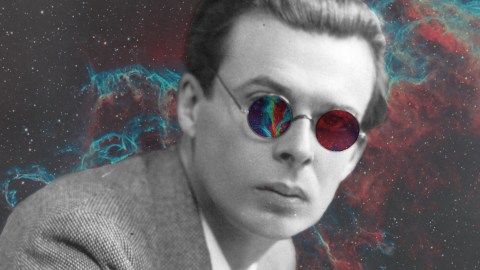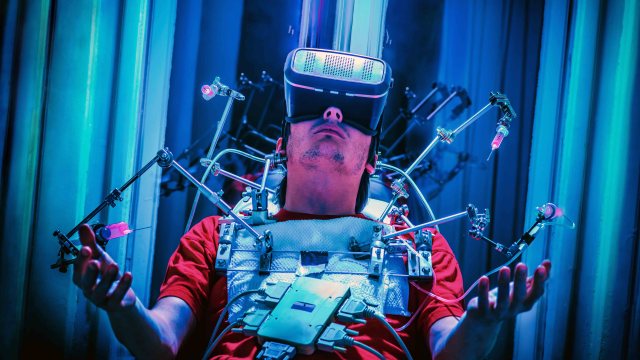4 philosophers who dropped acid

- The world is enjoying a bit of a psychedelic renaissance.
- The phenomenon of micro dosing, in which a fraction of a hit of LSD is taken to gain the supposed benefits without the hassle of hallucinations, is increasingly popular in Silicon Valley.
- Medical research into psychedelics of all kinds is also expanding and finding new beneficial uses for these drugs in the treatment of psychological disorders.
Scientific evidence for the benefit of drugs
With decades of prohibitions on research, the scientific evidence of the benefits of such drugs is limited. There are many people who preach the supposed benefits of the drugs, but few of them can be said to be philosophers or respected scientists. Here, we offer the experiences of a few real philosophers and scientists on the possible benefits of psychedelics.
Gerald Heard, a British author who wrote many books on science, history, and human consciousness, tried LSD earlier than most people, in the middle of the 1950s. His use and private praise of the possible application of the drug as a catalyst to create moments of near-religious insight caused many other intellectuals to give it a try, including his friend and our final entry on the list Aldous Huxley, and psychedelic research pioneer Timothy Leary. He described the drug like this: “There are the colors and the beauties, the designs, the beautiful way things appear… But that’s only the beginning. Suddenly you notice that there aren’t these separations. That we’re not on a separate island shouting across to somebody else trying to hear what they are saying and misunderstanding. You know. You used the word yourself: empathy.” This interview has also been sampled into the song ‘Waking Bliss’.
Alan Watts, one pro-LSD philosopher
Alan Watts, the British philosopher best known for popularizing the ideas of Eastern philosophy to his Western audience, also experimented with LSD and other drugs. He saw them as being of use in offering “glimpses” to a greater spirituality, and in helping individuals understand their connection to the universe. He later concluded that, “If you get the message, hang up the phone. For psychedelic drugs are simply instruments, like microscopes, telescopes, and telephones. The biologist does not sit with eye permanently glued to the microscope, he goes away and works on what he has seen.”
Sam Harris: Can psychedelics help you expand your mind?
Sam Harris, an American neuroscientist and so-called horseman of new atheism, experimented with MDMA for the mental effects rather than the physical ones. His MDMA trip resulted in a profound understanding that he was connected to every sentient being in existence. The trip was so powerful for him that it took him years to fully be able to integrate the ideas into his intellectual life.
He also mentions, despite being an advocate of secular meditation, that while meditation is useful it might not work for everybody. This is as opposed to psychoactive drugs, which will cause some effect if taken in a large enough dose. He does temper this notion, however, and states that anything you can do with psychedelics can be done without them. He does accept that he would never have supposed such an experience would be possible without the drugs, if he had not taken them initially.
Jason Silva: We’re going through a psychedelic renaissance
British philosopher Aldous Huxley, best known as the author of Brave New World, experimented with psychedelic drugs in the late 1950s. His ideas on the subject are recorded in his books The Doors of Perception and Heaven and Hell. Huxley believed that drugs such as mescaline and LSD allowed us to view the world “as is” rather than as we normally experience it—in a way more fitting for survival. He called this manner of viewing the world the “mind at large”, and argued that it was a wonderful perspective that many people would benefit from.
He also argued that every culture across time has sought some kind of chemical escape from daily life. In his opinion, psychedelics were a healthier alternative to tobacco and alcohol, achieving the goals of escape alongside psychological and mystical realizations.
However, Huxley also believed that LSD should not be popularly available, but used only by “the best and brightest”. He mentions at the end of his book that drugs are not enlightenment, but merely helpful for the intellectual who might be attached to words and symbols. His occasional enjoyment of drugs lasted the rest of his life; his last words were a request to his wife to be injected with LSD before dying. She obliged him.
There are, of course, other philosophers and thinkers who tried the stuff and had things to say about it. George Carlin, Richard Feynman, and Steve Jobs for example. The less philosophically inclined who still got a great deal out of their trips and were open about it include Jimi Hendrix, Ken Kesey, Cary Grant, and George Harrison.
While all these icons of art and science disagree on the benefits of those drugs being generally available to the public, or even what those benefits are, they did converge on one thing: that the mind-bending effects are good for some people.
That’s not to be interpreted as blind endorsement—Sam Harris is perhaps clearest on that when he says: “This is not to say that everyone should take psychedelics… these drugs pose certain dangers. Undoubtedly, some people cannot afford to give the anchor of sanity even the slightest tug.” As the West continues to consider the pros and cons of differing chemical substances, the testimony of some intelligent and successful people must be included in any discussion.





